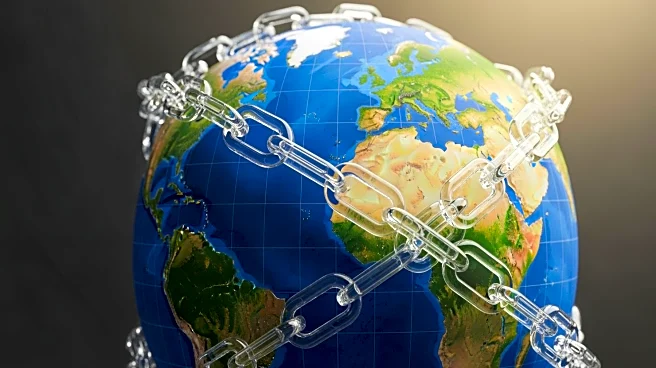What's Happening?
The United Nations Convention Against Corruption (UNCAC) has faced criticism for excluding civil society organizations (CSOs) from its Conferences of States Parties (CoSPs) due to objections from member
states. These objections, often anonymous and without justification, have raised concerns about censorship and the weakening of international anti-corruption efforts. Between 2017 and 2023, multiple CSOs were barred from participation, with objections frequently attributed to geopolitical tensions involving countries like Türkiye and Azerbaijan. The UNCAC Coalition, a network of NGOs focused on anti-corruption, has emphasized the importance of CSO involvement in promoting transparency and accountability. The exclusion process, governed by Rule 17 of the UNCAC Rules of Procedure, allows states to object to CSO participation anonymously, leading to concerns about the politicization of the UNCAC process.
Why It's Important?
The exclusion of CSOs from UNCAC CoSPs is significant as it undermines the convention's goal of promoting inclusive and transparent anti-corruption efforts. CSOs play a crucial role in holding governments accountable and ensuring transparency, and their exclusion could weaken international anti-corruption initiatives. The objections, often politically motivated, reflect broader geopolitical conflicts and domestic political considerations, which could hinder the effectiveness of UNCAC. The politicization of the objection process raises questions about the integrity of the UNCAC and its ability to foster genuine international cooperation against corruption. As CoSP11 approaches, the potential for new objections looms, highlighting the need for transparency and accountability in the objection process.
What's Next?
With CoSP11 scheduled for December 2025, the UNCAC Coalition is wary of potential objections and aims to prevent exclusion via unjust objections. The history of objections suggests that geopolitical dynamics are increasingly influencing UNCAC participation, and new objections are likely, particularly from countries like Türkiye and Azerbaijan. The recurring nature of these controversies indicates that geopolitical rivalries are embedded within the UNCAC process, posing challenges to civil society participation. Strengthening transparency and accountability in the objection process is crucial to prevent states from suppressing civil society under the guise of procedural formality.
Beyond the Headlines
The objections against CSOs reveal deeper geopolitical issues, such as Türkiye's conflict with the Fethullah Gülen movement and Azerbaijan's dispute with Armenia over Nagorno-Karabakh. These geopolitical tensions have influenced states' use of Rule 17 to exclude CSOs, reflecting broader international rivalries. The politicization of the UNCAC process highlights the need for reforms to ensure that civil society participation is not hindered by geopolitical considerations. The exclusion of CSOs could have long-term implications for the credibility and effectiveness of international anti-corruption efforts.










